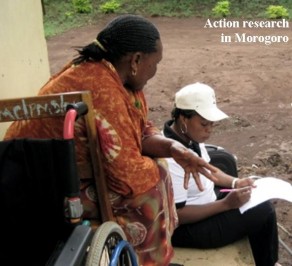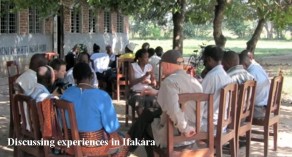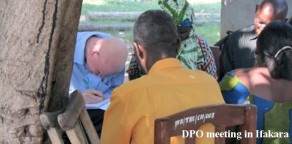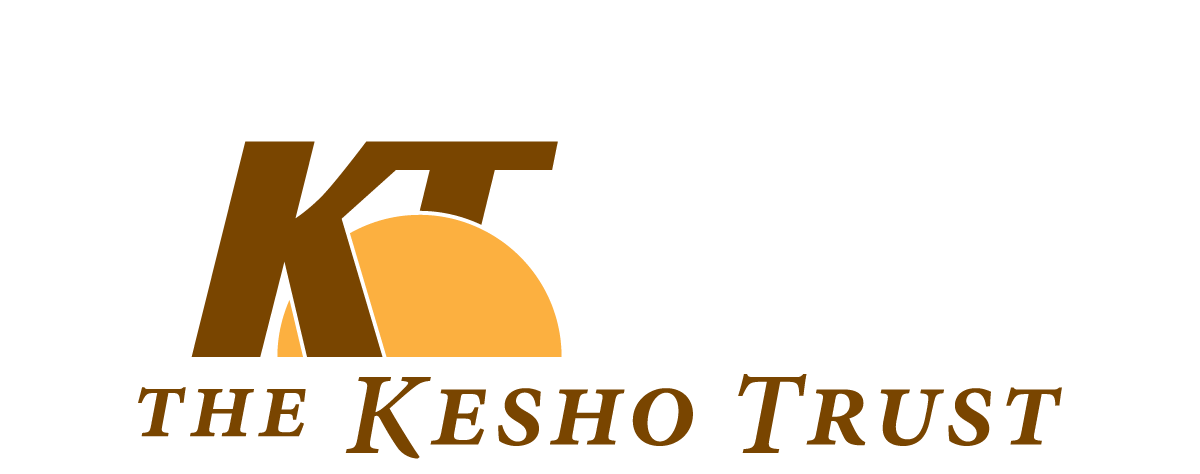 Since the project began I have worked on identifying other disabled people and also on identifying barriers and challenges. This work has helped me to realise I am not alone with my disability and that others share many of my challenges. – DPO representative, Ifakara
Since the project began I have worked on identifying other disabled people and also on identifying barriers and challenges. This work has helped me to realise I am not alone with my disability and that others share many of my challenges. – DPO representative, Ifakara
The start of 2013 has seen KT Tz given the opportunity to implement an exciting new project, Inclusive Community Awareness and Advocacy on Disability (ICAAD), with the aim of empowering people with disabilities at community level to challenge the barriers that exclude them from participating in development. There is power in collective action, as the quote above demonstrates, but people with disabilities in Tanzania often live isolated lives unaware that negative attitudes and unfriendly services don’t have to be the norm.
With Canada, the UK and Tanzania all having ratified the UN Convention on the Rights of Persons with Disabilities (CRPD), (link www.un.org/disabilities) it is important that we pay attention to how inclusive our work is and build good relationships with disabled people. The CRPD states in Article 32, that international development programs should be ‘inclusive of and accessible to persons with disabilities;’ which means we have to do what we can to make our work inclusive. The best way of achieving that is to work with disabled people and this new project offers us a great chance to strengthen our links with the disability sector in Tanzania.
We began working with Disabled People’s Organisations (DPOs), which are groups formed by people with disabilities to represent their needs, during 2011 when the Accountability in Tanzania program (AcT) gave DPOs a capacity building grant to help improve their ability to advocate. Some of our staff helped develop and implement a program that focused on maximising national DPOs advocacy potential by motivating members in communities to take more action locally. Over the course of 18 months, we worked with DPOs in Hai, Moshi, Kilombero and Morogoro to build their capacity, designing and supporting disability awareness training for DPO members and local government representatives and facilitating an action research process focused on access to basic education (action research report).

During this time DPOs identified and registered 1,249 people with disabilities who had previously been isolated and unaware that organisations existed in their communities which could represent their interests. It was also an opportunity for members of the community, local leaders and district officials to find out that Tanzania has laws which protect against the discrimination of people with disabilities (Disability Act, 2010) and that it has ratified an important international framework which protects the human rights of persons with disabilities.
Learning as we went, we were able to see that tangible improvements to the inclusion of people with disabilities happened when disabled and non-disabled people worked together to identify solutions. The action research process made a particularly strong contribution to this – people with disabilities were going into communities for the first time to ask questions about why basic services (like education and food relief programs) were not accessible to them. Having first realised they had a right to benefit from such services (most people with disabilities do not expect to be included) DPO members were keen to talk to service providers about how the delivery of services could be made more accessible. For their part, most service providers and government representatives agreed that they needed to be more disability friendly and were impressed that they were being held to account by people with disabilities.
ICAAD, also funded by AcT, represents an opportunity for us to put all the learning from the capacity building project into action so that more people with disabilities in Hai, Moshi, Kilombero and Morogoro are empowered and more inclusive development activities are run in these communities.
Preparations are now well underway for the launching of ICAAD. Each participating national DPO will be given a core grant, most of which will be distributed to the 20 participating community branches. This funding will enable DPO representatives to meet together to plan local actions, represent their issues to local government and most importantly to get out into their wards and villages to raise awareness and locate new members.
Over the coming months we will continue to provide mentoring support to branch DPOs as they develop their capacity to represent disability in local development planning and monitor progress against changes in attitudes and behaviour towards people with disabilities. At the same time, KT Tz will be looking at how we can be more inclusive across all our work, so that as an organisation we can play our part in helping promote more inclusive development.
We will keep you posted on progress and hope to bring you more examples of people with disabilities making important contributions to the development of their communities.

